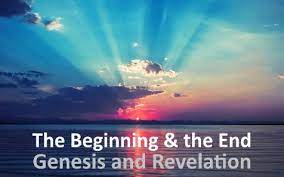The Anticipation of Eternity

Genesis is important not only as the history or the origin of mankind, but also as a prophecy of the future of mankind. The book of Revelation should be taken no less seriously than Genesis. Paradise was lost in Genesis and is regained in Revelation.
The beginning of Genesis describes a perfect world, made for man and placed under his authority. Had Adam and Eve not sinned they would have continued to rule and enjoy that perfect world. But they did sin. Since God cannot be defeated in His ultimate purpose, even though sin and the curse have come in as intruders for a time, we can be sure that all that the LORD intended in the garden of Eden will eventually come to pass. Therefore, the earth will be restored to its original perfection and will continue on into eternity. Sin and the curse will be no more and death will be eliminated.
It is helpful, therefore, to compare the people and events in Genesis to those in Revelation. We can learn much about the original world by studying Revelation, and we can learn much about the final world by studying Genesis. In a very real way they are fundamentally the same.
The First World (Genesis), but in the far eschatological future, an Eternal World (Revelation)
A new beginning (Gen 1:1 to 2:3), but in the far eschatological future there will be a new creation (Rev 21:1 to 22:5).
Division of light and darkness (Gen 1:4), but in the far eschatological future there will be no more night (Rev 21:25).
Division of land and sea (Gen 1:10), but in the far eschatological future there will be no more sea (Rev 21:1).
Rule of the sun and the moon (Gen 1:16), but in the far eschatological future there will be no need of the sun or the moon (Rev 21:23).
Mankind in a prepared Garden (Gen 2:8-9), but in the far eschatological future mankind will be prepared in a City (Rev 21:2).
A fiver flowing out of Eden (Gen2:10), but in the far eschatological future will be a river flowing from God’s throne (Rev22:1).
Gold in the land (Gen 2:12), but in the far eschatological future there will be Gold in the City (Rev 21:21).
Tree of life in the midst of the Garden (Gen 2:9), in the far eschatological future there will be a Tree of life throughout the City (Rev 22:2).
Pearls and the onyx stone were there (Gen 2:12), but in far eschatological future there will be all kinds of precious stones (Rev 21:19).
God walked in the Garden (Gen 3:8), but in the far eschatological future God will live in the City (Rev 21:3).
Walk with God broken (Gen 3:8-10), but in the eschatological future, our walk with God will be resumed (Rev 21:25-22:14).
Many other comparisons can be made. Each shows that the specific characteristics of the first world were suited for man in his state of innocence, while the matching characteristics of the eternal world will be designed for humanity in a state of perfection. The most striking contrast that can be made is between the cursed world in Genesis and the eternal world in Revelation.
The Cursed World, but in the far eschatological Eternal World
Sin entering human experience (Gen 3:1-8), but in the far eschatological future there will be no more sin (Rev 21:8 and 27).
The triumph of the Serpent (Gen 3:13), but in the far eschatological future there will be the triumph of the Lamb (Rev 20:10; 22:3).
The ground was cursed (Gen 3:17), but in the far eschatological future there will be no more curse (Rev 22:3).
Daily sorrow (Gen 3:17), but in the far eschatological future there will be no more sorrow (Rev 21:4).
Thorns and thistles (Gen 3:18), but in the far eschatological future there will be no more pain (Rev 21:4).
Sweat on the face (Gen 3:19), but in the far eschatological future our tears will be wiped away (Rev 21:4)
Eating plants of the field (Gen 3:18), but in the far eschatological future we will receive crops of fruit each month (Rev 22:2).
Death entered the world (Gen 3:19), but in the far eschatological future there will be no more death (Rev 21:4)
Evil all the time (Gen 6:5), but in the far eschatological future nothing will be impure (Rev 21:27).
Garments of animal skins (Gen 3:21), but in the far eschatological future we will be dressed in fine linen, white and clean (Rev 19:14).
Satan opposing (Gen 3:15), but in the far eschatological future Satan will be thrown into the lake of burning sulfur (Rev 20:10).
Kept from the Tree of Life (Gen 3:24), but in the far eschatological future, we will have access to the Tree of Life (Rev 22:14).
Banished from the Garden of Eden (Gen 3:23), but in the far eschatological future we will have free entry in the New Jerusalem (Rev 22:14).
Redeemer promised (Gen 3:15), but in the far eschatological future, our redemption will be accomplished (Rev 5:9-10).
The Rainbow of Noah (Gen 9:16), but in the far eschatological future we will see the Rainbow of Christ (Rev 10:1).
Paradise lost (Gen 3:23), but in the far eschatological future Paradise will be regained (Rev 21:25 to 22:14).
For these and many other reasons, it is clear that a proper understanding of Genesis is critical to a proper understanding of the eternal purposes of God.3
NEXT PAGE: Ae – The Number Seven



More Bible knowledge